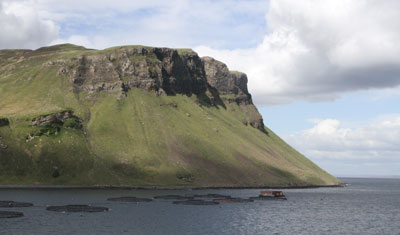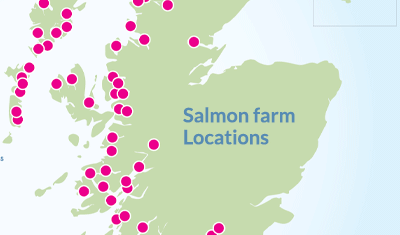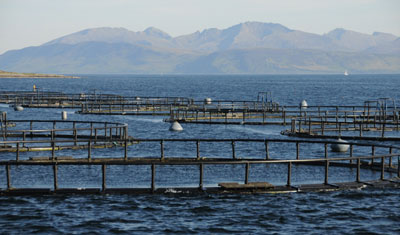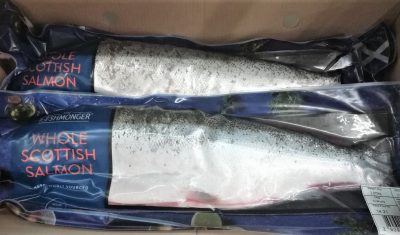Our Position
Our targeted, collaborative and pragmatic approach to calling for best practice across the Scottish salmon farming industry.
This phase of Fidra’s Best Fishes project has now ended. However we encourage retailers, suppliers and industry to continue to work toward meeting the 10 Key Principles which Fidra believes are essential to ensure transparency, traceability and sustainability throughout the Scottish salmon supply chain.
10 key principles for salmon farming in Scotland
Action is urgently needed to minimise environmental damage and improve accountability. To achieve this, Fidra believes that the management of salmon farming in Scotland must be based upon 10 principles covering transparency, traceability, operational best practice and broader environmental impacts.
Increased transparency and traceability in the Scottish salmon supply chain remains an important prerequisite for positive change across the industry and requires:

- Farm level reporting of compliance with the Controlled Activities Regulation (CAR) licence issued by the regulator, the Scottish Environment Protection Agency (SEPA), including details of failures and resulting penalties or action taken;
- Development of a single central salmon farming dashboard presenting clear data down to individual farm level (e.g.Tasmania’s Salmon Portal , Norway’s Barents Watch);
- Use of traceability programmes that allow labelling of goods at point of sale with information such as name of farm and certification; (e.g. Lidl, M&S, Co-op)
- Publication of 3rd party audits from certification schemes, as already undertaken by the Aquaculture Stewardship Council (ASC).
A commitment to best operational practices is essential in addition, with a need to:
- Act on REC Committee’s recommendations and statutory obligations, specifically, to solve current environmental issues before expanding the industry, such as those associated with sea lice, disease, medicine use, waste and predators;
- Urgently commit to move towards sustainable feed, including traceable ingredients, and alternatives to forage fish sources of omega 3 and proteins, such as algal oil or fish processing waste;
- Increase innovation, especially digitisation and automated monitoring of environmental parameters, with information sent to a central, publicly accessible platform;
- Certify farms by best practice schemes such as ASC, GLOBAL G.A.P., RSPCA and Soil Association (organic).
The broader environmental impacts due to plastic waste, the climate emergency and the biodiversity crisis need to be addressed in addition to the areas highlighted by the REC Committee, and parameters covered by current regulation, with commitments to:
- Act on plastic use and waste, including policies on responsible sourcing and disposal, monitoring of use and waste including microplastics, research into sustainable alternatives, and reusable/recyclable replacement of single use plastics such as polystyrene fish boxes;
- Responsibly act on the climate emergency and the biodiversity crisis, with policies that show how the industry contributes to and responds to both, and clear processes to mitigate and monitor impacts, including precautionary actions.
Our Briefings



Our collaborative approach
We believe it is paramount that the Scottish salmon farming industry uses a supply chain approach to ensure the environmental impact of the industry are minimised. There is an array of opportunities available to ensure best practice can be followed. Government, regulators, industry, NGO’s, retailers and the wider public/community groups need to work together to ensure the needs of the environment are put at the forefront of all future aquaculture legislation.
Collaborative workshops
Throughout this project Fidra commited to working with all stakeholders in the Scottish salmon farming sector. We have attended and hosted a variety of workshops in the past to understand all stakeholder perspectives.
In 2020 and 2022, Fidra hosted workshops in partnership with the British Retail Consortium (BRC). Stakeholders were invited from across the Scottish salmon supply chain, including retailers, suppliers and industry. The aim of these workshops was to discuss the challenges of increasing transparency and traceability in the Scottish salmon supply chain, and how they could be overcome.
Following these collaborative workshops, Fidra and the BRC hosted a webinar event in 2023 to share the progress which has been made by stakeholders since 2022, next steps and plans for continued improvement to increase transparency and traceability within supply chains.
Download the workshop summaries below
Dashboard Criteria
It is widely believed that whilst Scottish salmon farming data availability is among the best globally, the accessibility of this data is not appropriate for all who needs access to this data. The way in which salmon farming data is communicated should be standardised across the supply chain. A single, centralised database with relevant and user-friendly information would verify the performance of supply chains and increase best practice across the sector (e.g. Norway’s Barents Watch and Australia’s Tasmanian Salmon Farming Data (Salmon Portal) . We propose the following information be accessible to suitable audiences via an online salmon farming dashboard:
| Environmental Criteria | Detail required | Public/local communities | NGO’s | Retailer’s |
| Sea lice counts; other diseases | Real time data | Essential | Essential | Essential |
| Mortality | Rates, causes and mitigation | Essential | Essential | Essential |
| Benthic survey details | Reasons for ‘unsatisfactory’ results, action taken | Essential | Essential | Essential |
| CAR license | Compliance, breaches, enforcement | Essential – low level of detail | Essential | Essential |
| Wildlife interactions | Seal, otter and bird mortalities | Essential – low level of detail | Essential | Essential |
| Medicine use | Medicine, application method and dosage | Essential – low level of detail | Essential | Essential |
| Chemical use | Chemical. application method and dosage | Essential – low level of detail | Essential | Essential |
| Planning applications | Details of company site, biomass, EIA | Essential | Essential | Essential |
| Escape events | Reasons, recovery and mitigation | Essential – low level of detail | Essential | Essential |
| Production tonnage | From farm to country level | Essential – low level of detail | Essential | Essential |
| Plastic/other litter | Mitigation policies or guidelines | Desirable | Desirable | Desirable |
| Climate change | Carbon footprint, mitigation policies | Desirable | Desirable | Desirable |
| Feed conversion ratio | By site | Desirable | Desirable | Desirable |
| Accreditation | Accreditation held including audits | Desirable | Desirable | Desirable |
Retailer Dashboards
Following engagement from Fidra, an increasing number of retailers have implemented online information dashboards, providing further information on product sourcing and supply chains to customers, for example information is available from M&S, Lidl and Co-op . This is a positive step in providing customers accesses to information on the salmon products they are buying. We encourage retailers to continue to provide customers with access to information on the products they are purchasing on pack. We also encourage the adoption and continued improvement of online retailer dashboards across all U.K. retailers.
Certification schemes
Fidra believes third party audits are an important component of any industry. Certification offers this within the Scottish salmon farming sector. Theses certifications set an agreed standard in which a farm must conform to, and includes audits undertaken by independent organisations. If you want to know more detail about our position on certification in salmon farming click the link below.

